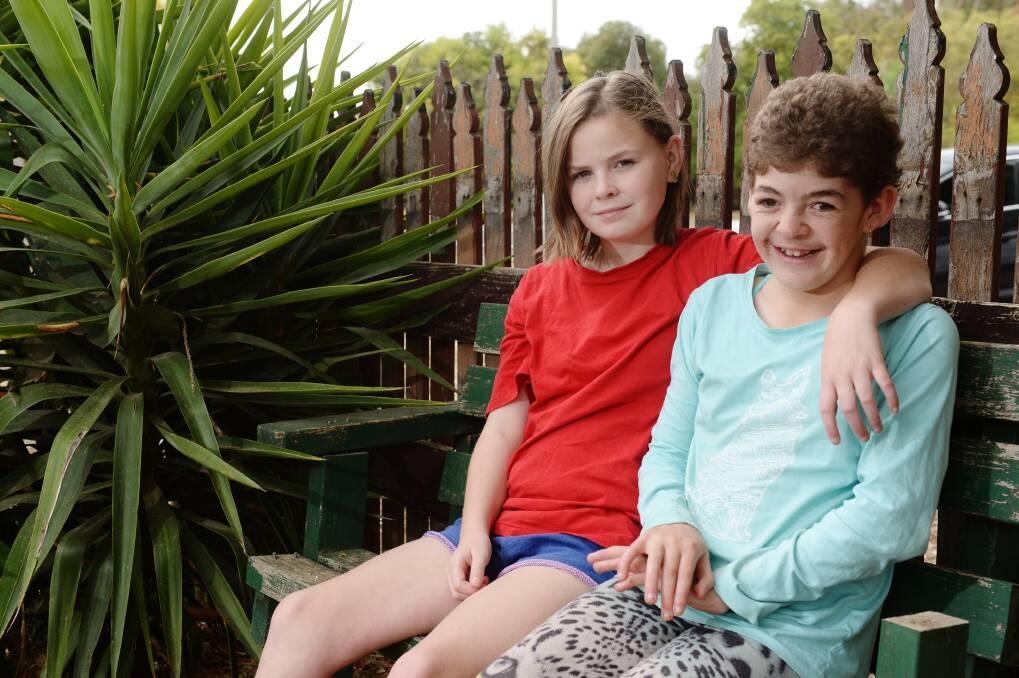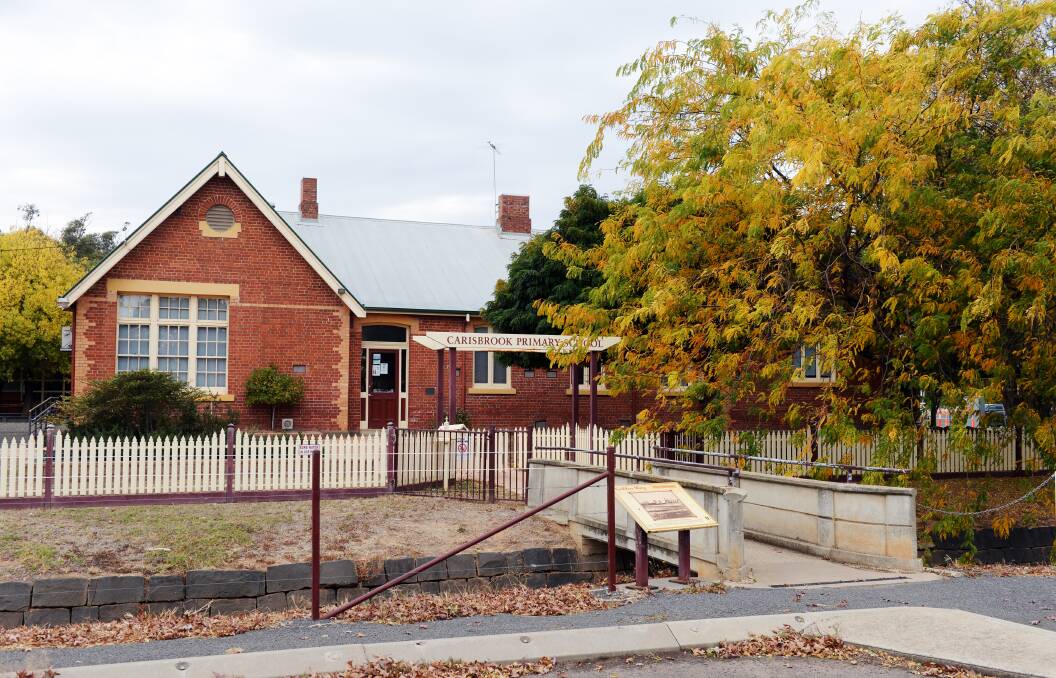
If you had just met her, Regan Elliott would seem the happiest child in the world. She's constantly smiling and willing to engage with you, interested and curious.
Subscribe now for unlimited access.
$0/
(min cost $0)
or signup to continue reading
Regan is a twin. Her curly dark hair is a world away from the lighter, straight locks of her sister Tamara. She's also much smaller, and she won't win you into a spoken conversation about the things that interest her. She'll look at you, point, drag you to things she wants you to see, but she can't explain what they are or what they might mean to her. Regan can't talk.
Her parents Marita and Stuart Elliott - and the medical profession - are unable to say exactly why Regan is unable to communicate. She's had no definitive diagnosis. This is her list of her medical issues:
- Undiagnosed developmental delay, speech absence and dysmorphism.
- Autism spectrum disorder.
- Intellectual disability (full scale IQ less than first centile).
- Anxiety and obsessive-compulsive traits.
- Intermittent constipation.
- Cyclical vomiting phenomena.
- Slow left renal growth with recurrent UTIs.
Dysmorphism is a difference from the regular shape in body structure, which Regan displays in her size and facial development. She obsesses over things going on in the home, which makes family life complex, Ms Elliott says. Her needs sometimes exclude the attention her siblings require; she can become anxious and try to control her surroundings. If her father does work on their house, she feels she needs to try to control the family's dogs; she can obsess over anything her brother James is doing and interfere.
Regan shows traits of what is called Angelman, or 'happy puppet' syndrome, a genetic disorder of the nervous system which makes people appear to be smiling and sociable. She also has elements of Mowat-Wilson syndrome, a disorder which includes distinctive facial features, intellectual disability and intestinal problems.
It's important to recognise while she shows traits of both of those syndromes, she doesn't 'have' either of them, her mother says.

Regan's Ballarat paediatrician Dr David Tickell has recommended her for the detailed genetic testing process of exome sequencing (see below), but for the present time Regan has to get through life as best she can.
Regan will be 13 in June. Her parents insisted she would have the same opportunities to attend school as her brother James and twin sister, and she's done that from prep class onwards. But it's been a battle; one Ms Elliott thinks is unwarranted and has found heartbreaking.
She wants parents of children like Regan to avoid the pain she's experienced trying to get her accepted in the conventional schooling system; of having people say her daughter has nothing 'wrong' with her. Being told her daughter is simply 'putting it on'; that her inability to talk is a 'choice'.
The connection Marita shares with her daughter is subtle. She can pick up on the small gestures and sounds Regan makes and anticipate what her needs are.
"To meet her, you'd think she is actually understanding what you're saying," Ms Elliott says.
"She'll be acknowledging you, nodding her head - but quite often she's not getting what you're saying. You can be laying out all these things that you're asking her to do: you can say 'get the bread out, butter the bread, get the Vegemite, make a sandwich.'
"And she might get to the Vegemite part and grab something else that she's completely convinced is the Vegemite. It's not, but she's acknowledged you through all the steps. She just can't fathom them all. Even if you break it down she'll still get to that point where she can't (get any further)."
She says her daughter didn't learn to walk until she was three-years-old, but she and husband Stuart had no complete idea of her developmental delays. As much as any loving parents would, they assumed she'd grow through them. Now they know better.
"It has been really hard," Ms Elliott says quietly.
"These (the disabilities) are all things we are now learning. She's been put forward for funding for a genetic blood test and it's looking a lot more positive; that we may get a result. But the doctors have also said there's every possibility that we won't."
The Elliotts live in Carisbrook, a small town just under 10 kilometres from Maryborough. It's an old town, founded during the pre-gold rush days, and it's close-knit. The local primary school is the focal point for the community.

When James Elliott went to Carisbrook Primary School, its teachers were aware that his twin sisters were due to follow him. Ms Elliott says the school's management started to arrange the requirements needed to allow Regan into the life of the school.
At the outset, Ms Elliott says there was widespread acceptance for Regan.
"If you talk about the inclusiveness at that school - and if I could stop myself from bursting into tears, because I really hate that - pretty much it was there to start off with."
Children such as Regan require trained aides to assist them, not only with learning but with the fundamental needs of life, such as going to the toilet. They are funded through the departments of Education and Health and Human Services by the state government, and are administered by the relevant school.
A Department of Education and Training spokesman said: "We know that supporting students with additional needs and strengthening inclusive education is a fundamental part of building an equitable and excellent education system.
"Schools work with students' families and the professionals working with them to ensure students with additional needs have the support to learn effectively.
"The Program for Students with Disabilities provides additional funding to schools to support students with disabilities with high needs.
"This funding is given directly to schools for principals to determine how the allocated resources can best be used to support the individual needs of their students.
"Schools may access a range of resources through the Program for Students with Disabilities. As well as employing education support staff such as student aides, this can include engaging specialist staff such as speech pathologists or occupational therapists, experienced teaching staff, specialist equipment or materials and teacher professional development.
"Student aides are just one of many ways that schools support students with a disability."

At first, Regan was supplied with an aide, who supported her through prep through to almost the end of grade two.
After this, the aide left the school, leaving Regan unable to communicate for three months. Trials with her writing messages on her mobile phone to speak with teachers had limited success.
It's hard to understate the importance of an aide's assistance to Regan; how her basic human dignity can be compromised so easily because of her inability to tell people what she needs or wants; how she feels.
One support worker, who asked not to be identified, says it needs to be made clear that people with conditions such as Regan's are very much hidden in our society.
"Nobody knows her point of view; nobody can hear what she wants."
"Simple things like buying milk or bread. She can't do that if she can't communicate with the shop owner. Communication is everything, from when you wake up until you go to bed, and we take it for granted.
"A child should be able to function in society. It doesn't matter who they are or what their disability is, they have so many abilities and there shouldn't be a line which stops them. Surely if Regan can make sounds, and she knows what the alphabet is, we can turn that into two-letter words, and then three-letter words... it just takes time. But we need to see what she can do, not what she can't."
For the next three years Regan's aide was a part-time position at the school, something that still hurts Ms Elliott despite her now moving into secondary school.
"You're talking about someone who cannot talk and has very little understanding," she says. Her voice breaks as she speaks about a parent-teacher meeting, where Regan's teacher told her what happened when there was no aide available in the classroom.
"Her teacher, she would ask a question of the kids, and the kids would put their hands up, and Regan would look around and see them and then put her hand up wanting to join in, and the teacher said, 'I can't ask her..."
There's no doubt the struggle to get an education for Regan has taken a toll. Marita Elliott doesn't want to talk about it openly, but acknowledges people in Carisbrook have polarised views about what's happened over the past four years. But she remains unflinching.
"The girl's got a right to go to school, to have an education. I don't want to be the troublemaker all the time."
What is exome testing?
Regan's paediatrician, Dr David Tickell, says Regan's dilemma is not an uncommon one. He says there are several cases, especially with children, where a specific diagnosis often cannot be reached.
Dr Tickell is the clinical director of Specialist Clinics, Women's and Children's Health for Ballarat Health Services, and a senior lecturer at the University of Melbourne and Deakin University.
"There is no unifying cause for Regan being the way she is that is able to be identified, despite extensive testing," Dr Tickell says.
"It's a very complex presentation. We are recommending she undergo exome sequencing, which is a new form of more detailed genetic testing.
"There are only a certain number of these tests funded each year, and we have to ensure the patient meets specific eligibility criteria. Unfortunately it doesn't guarantee the test will find anything conclusive. We see many patients with complex syndromic presentations; they are not uncommon.
"We are increasing our ability to diagnose, but it is still not all-explanatory; there are multiple medical difficulties within these conditions that remain challenging."
Exome testing, or sequencing, tests parts of the human genome, the building block of what makes us Homo sapiens. It's comprised of nucleic acid sequences, encoded as DNA in our 23 chromosomes and other mitochondria.
The testing of the exomes within our genome is enabling diagnoses to be made of genetic disorders that evaded medical understanding in the past. Unlike previous genetic tests that look at one specific gene, exome sequencing can test many genes simultaneously.
Have you signed up to the Bendigo Advertiser's daily newsletter and breaking news emails? You can register below and make sure you are up to date with everything that's happening in central Victoria.


